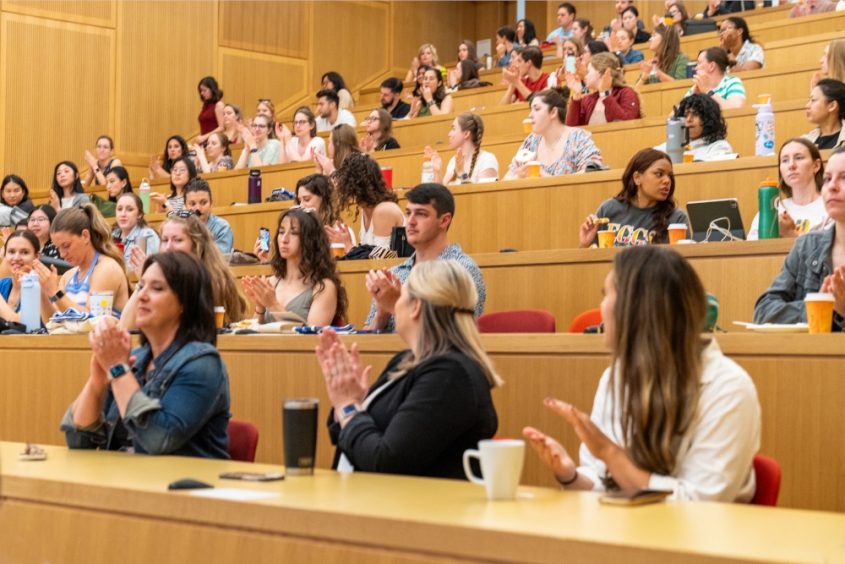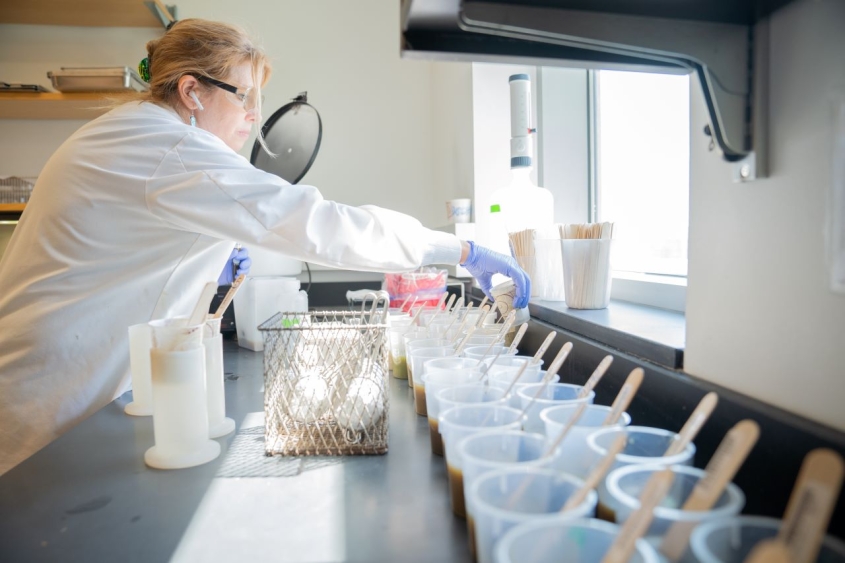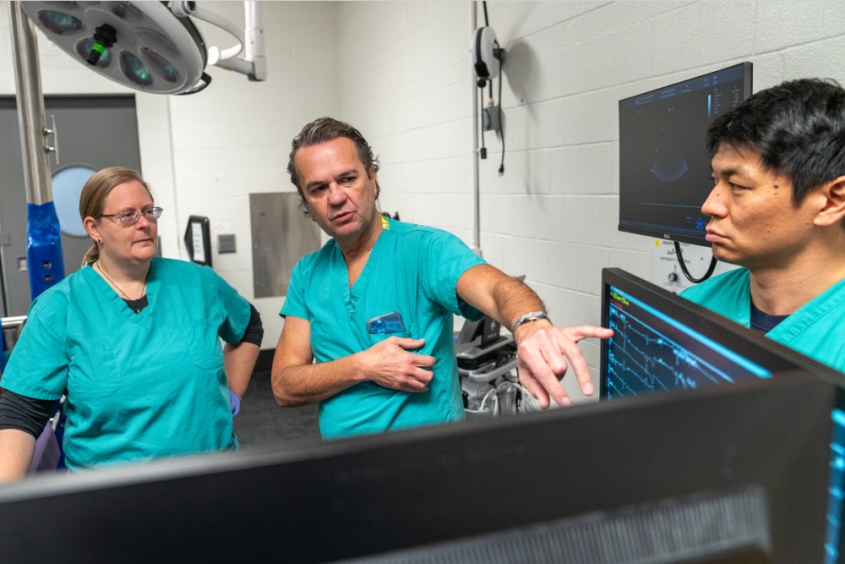About the College
Veterinary medicine, taught by Professor James Law, was among the founding disciplines when Cornell University opened its doors for classes in 1868. Daniel Salmon was among the small group of students gathered to mark the occasion. He went on to receive the first D.V.M. degree awarded in the United States in 1872. Professor Law and others worked tirelessly to grow and formalize the program, leading to the establishment of the college as the New York State College of Veterinary Medicine in 1894, the first of the state supported “contract colleges” at Cornell University. During those early years, college faculty, students and graduates were instrumental in establishing veterinary medicine as a science-based profession. They led major programs in infectious disease research and disease control. As the college grew, it moved through a succession of facilities on the main campus until the opening of the current veterinary complex in 1957. Along with other Cornell contract colleges, the College of Veterinary Medicine was brought under the State University of New York umbrella in 1948.
Today, the college includes over 250 faculty, including both tenure-track and research, teaching and extension (RTE) track in six departments, ten institutes and centers, over 600 hundred employees, and over 725 students in four degree programs. Our facilities underwent major renovations and expansion completed in 2017 and will soon see further extensive renovations.
Our college has always worked to improve the health of animals and people, educate future professionals, meet critical needs for New York State, and advance knowledge through scientific research. We continue to build on decades of success in those areas today. Cornell was founded on the principle of “any person, any study.” Over our long history, the college did not always live up to original ideals of equal access and opportunity, but over recent decades made substantial progress in removing barriers for enrollment and success for people from all backgrounds. At the same time, new challenges have arisen as the costs of education for professional degree programs have shifted more to individuals and families and the interest in some of our degree programs have far outpaced capacity.
As an institution of learning, our degree programs are central to everything we do. The Doctor of Veterinary Medicine (D.V.M.) degree is a four-year professional program admitting approximately 125 students per year. Graduate degree programs are administered in collaboration with the Graduate School and include Ph.D., a Master of Professional Studies (M.P.S.) and the most recent addition of the Master of Public Health program. While our college does not directly admit undergraduate students, our faculty teach hundreds of undergraduates per year in formal course work and host hundreds for experiential learning in research laboratories.
Besides the extensive work of faculty, our students are supported by student services professionals who handle everything from admissions to enrollment and degree progression. We also have a strong network of student organizations. Graduates of the college pursue careers in clinical veterinary practice, government and military service, wildlife conservation, academia, biomedical research, public health practice and leadership, and much more.
Beyond our formal degree programs, our continuing education events advance the knowledge and work of veterinarians, technicians, educators and public health professionals, and the Cornell Veterinary Educators’ Academy builds on our college’s reputation for setting the standard in veterinary education.
Scientific discovery is a vital component of our college. Research programs drive progress in everything from basic scientific knowledge, to clinical application, to emerging disease threat response, to commercialization and product development. Key research strengths include genomics, immunology, developmental and reproductive biology; population medicine; and applied clinical studies. This vital scientific discovery is conducted by faculty-led teams of postdoctoral associates, graduate and other students, and technicians, and is funded by external federal, state or foundation support, as well as internal college funds. Numerous research projects are fueled by the invaluable data collections held in the Cornell Veterinary Biobank, an ISO 20387 accredited resource. The college faculty leads or participates in many cross-campus research initiatives such as the Center for Vertebrate Genomics, the Center for Immunology, the Center for Antimicrobial Resistance, the Cornell Institute for Digital Agriculture and the Center for Dairy Excellence, Entrepreneurship at Cornell– to name a few notable examples. Our partnership with the Atkinson Center for Sustainability supports interdisciplinary research to advance One Health, creating a future in which people and nature thrive.
Public service is an additional cornerstone to our work, simultaneously filling critical societal needs while also providing opportunities to study health and disease in real-world settings for students. The Cornell Community Cancer Partnership, our Expanding Horizons International Education Program, Southside Health Pet Clinics, the M.P.H.’s applied practice experiences, and many more, represent valuable services to the community through engaged learning opportunities.
We serve the state and the country with vital diagnostic and extension services provided by the Animal Health Diagnostic Center (AHDC), in close partnership with New York State, which operates the main laboratory on campus in Ithaca, and four satellite laboratories throughout the state.
Our clinical services have widespread impact in the state and the greater Northeast; the Cornell University Hospital for Animals (CUHA) comprises six hospitals: the Companion Animal Hospital (CAH), the Equine and Nemo Farm Animal Hospital (ENFAH), the Small Animal Community Practice (SACP), the Ambulatory and Production Medicine Service, the Janet L. Swanson Wildlife Health Hospital, and the Cornell Ruffian Equine Specialists (CRES) in Elmont, New York. The college also owns and operates a for-profit small animal emergency and specialty hospital, Cornell University Veterinary Specialists (CUVS) in Stamford, Connecticut. These diagnostic and clinical programs provide impactful public service, research and learning opportunities for students and post-graduate trainees. Key college resources also include the Equine Park and the Teaching Dairy, which provide hands-on clinical training, research and valuable employment experience for students.
The college’s centers and institutes are instrumental in meeting public outreach and service goals. The Baker Institute for Animal Health will celebrate its 75Th year in 2025 and has been responsible for discoveries that have benefitted millions of animals and people. The Feline Health Center (FHC), established in 1974, is a leading source for accurate information on cat health, and sponsors a highly successful internal research grants program. The Cornell Maddie’s® Shelter Medicine program, founded in 2005, provides impactful education, service and research on shelter medicine and public health. Other centers and institutes include the Center for Dairy Excellence, the Center for Veterinary Business and Entrepreneurship (CVBE), the Richard P. Riney Canine Health Center (RCHC), the Duffield Institute for Animal Behavior (DIAB), and the Cornell K. Lisa Yang Center for Wildlife Health. Much of their work was achieved through generous donations from friends and supporters of the college.
Our international impact extends through many individual faculty-driven research programs, as well as institution-level partnerships, including our long-standing collaboration with City University of Hong Kong (CityU), which led to the establishment of the first internationally accredited veterinary education program in Hong Kong. To this day, CVM welcomes CityU students for several training programs and collaborates with CityU faculty through an innovation grant program and research activities.
Our overall success depends on the strength of the people who work and study here. Knowing this, we have expanded programs and staffing to help support our community. The Office of Inclusion and Academic Excellence (OIAE) provides programming to better meet the needs of a diverse community, coordinates with Belonging at Cornell efforts, and promotes inclusion and individual success of students, faculty and staff. This work is complemented by a growing well-being program to build skills and to help students prepare for future careers. The Human Resources team partners on these programs while also recruiting and supporting a large and dynamic workforce. The Staff Council and other representative groups play a critical role through staff support and recognition.
The college is represented throughout the world by our exceptional alumni, friends and supporters, many of whom volunteer their time and expertise. Our Alumni Affairs and Development (AAD) Office, in partnership with their university AAD peers, fosters connection and collaboration to achieve philanthropic goals. The generosity of many individuals has resulted in substantial increases in support for new student scholarships, faculty positions, centers and institutes and specific research advances.
The important learning, discovery and care that we do is shared with the world through our Marketing and Communications department’s multi-platform storytelling and marketing efforts, as well as connecting our experts and research in top-tier media outlets.
Our physical space includes nearly 150 buildings meeting highly variable needs – from classrooms to computing, animal care to accounting, laboratories to libraries. These many spaces and services rely on our teams of professionals managing IT, classroom support, facilities, biosafety, waste disposal, accounting, and purchasing and budgeting, to name a few.
This description represents only a fraction of our rich variety of work and achievements and cannot fully capture the countless individual initiatives and activities of faculty, staff and students. Whether we’re organizing healthy pet clinics, playing in our student-faculty hockey game, connecting cancer patients to researchers, training service dogs, and beyond, our college continues to carry forward Cornell’s legacy of doing the greatest good for all.





